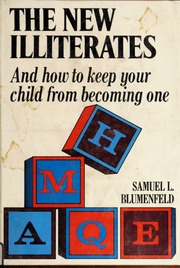
References and Quotes
Reference
Looking Behind Appearances
In his book The New Illiterates, author Sam Blumenfeld gives us the best introduction to what went wrong with reading in the United States. He also gives us insight into why learning to read needn’t be frustrating or futile. A typical letter from one of his readers boasts of her success in imparting the alphabet code to four children under the age of five by the simple method of practice with letter sounds. One day she found her three-year-old working his way through a lesson alone at the kitchen table, reading S-am, Sam, m-an, man, and so on. Her verdict on the process: "I had just taught him his letter sounds. He picked [the rest] up and did it himself. That’s how simple it is."
Quote
Used in: Frank Had A Dog; His Name Was Spot
Mind, like matter, can be made subject to experiment. (p. 133)
Where It's Used →PDF Not Available
Quote
Used in: Frank Had A Dog; His Name Was Spot
has [been] excited in the mind of the little learner (p. 134)
Where It's Used →PDF Not Available
Quote
Used in: Frank Had A Dog; His Name Was Spot
it led to a serious confusion in Gallaudet’s thinking concerning two very different learning processes: that of learning to speak one’s native language and that of learning to read it. It was easy to see the source of his confusion. In teaching the deaf to read by sight, he was also teaching them language by sight for the first time. They underwent two learning processes at the same time. But a normal child came to school already with a knowledge of several thousand words in his speaking vocabulary, with a much greater intellectual development which the sense of sound afforded him. In learning how to read, it was not necessary to teach him what he already knew, to repeat the process of learning to speak. It was only necessary to help him master the sound-symbol system, so that he could translate written words into spoken ones. The normal child did not learn his language by learning to read. He learned to read in order to help him expand his use of language, (p. 135)
Where It's Used →PDF Not Available
Quote
Used in: Frank Had A Dog; His Name Was Spot
Education is a great concern; it has often been tampered with by vain theorists; it has suffered much from the stupid folly and the delusive wisdom of its treacherous friends; and we hardly know which have injured it most. Our conviction is, that it has much more to hope from the collected wisdom and common prudence of the community, than from the suggestions of the individual. Locke injured it by his theories, and so did Rousseau, and so did Milton. All their plans were too splendid to be true. It is to be advanced by conceptions, neither soaring above the clouds, nor groveling on the earth, —but by those plain, gradual, productive, common-sense improvements, which use may encourage and experience suggest. We are in favor of advancement, provided it be towards usefulness. . . .
We love the secretary, but we hate his theories. They stand in the way of substantial education. It is impossible for a sound mind not to hate them. (p. 156)
Where It's Used →PDF Not Available
Quote
Used in: The Pedagogy Of Literacy
He must not, by reading adult grammatical and logical forms, be exercised in mental habits that will violate his childhood and make him, at the best, a prig. (p. 161)
Where It's Used →PDF Not Available
Quote
Used in: The Pedagogy Of Literacy
The history of the languages in which picture-writing was long the main means of written communication has here a wealth of suggestions for the framers of the new primary course. It is not from mere perversity that the boy chalks or carves his records on book and desk [...] There is here a correspondence with, if not a direct recapitulation of, the life of the race; and we owe it to the child to encourage his living through the best there is in this pictograph stage (p. 162)
Where It's Used →PDF Not Available
Quote
Used in: Dick And Jane
In 1930 the Dick and Jane Pre-Primer taught 68 sight words in 39 pages of story text, with an illustration per page, a total of 565 words and a Teacher s Guidebook of 87 pages. In 1951 that same pre-primer had been expanded to 172 pages, divided into three separate preprimers, with 184 illustrations, a total of 2,613 words, and a Guidebook of 182 pages to teach a sight vocabulary of only 58 words! (p. 166)
Where It's Used →PDF Not Available